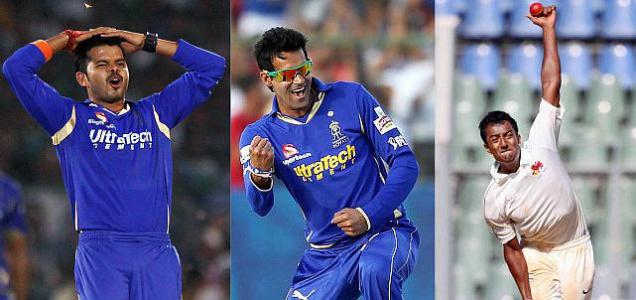New Delhi: Suspended pending enquiry by the Board of Control for Cricket in India (BCCI) on May 16, 2013, following spot-fixing and corruption allegations against them in the IPL-VI tournament, former India seamer S. Sreesanth and spinner Ankeet Chavan face the prospect of being banned from playing the game at all levels for many years and also from taking part in any activities under the auspices of the BCCI.
Arrested by the Delhi Police special cell after the Mumbai Indians versus Rajasthan Royals IPL-VI match at the Wankhede Stadium on May 15, Sreesanth and Chavan were subsequently released on bail.
Sreesanth, Chavan and Siddharth Trivedi and Harmeet Singh — the last two played for the Royals this season — and former Royals seamer Amit Singh will appear before the BCCI’s disciplinary committee at New Delhi on Friday.
While Harmeet Singh was suspended by the BCCI in the first week of July, Amit Singh, a registered player with the Gujarat Cricket Association, was also arrested by the Delhi Police for his alleged role in spot-fixing and suspended by the BCCI on May 17.
According to reports, both Trivedi and Harmeet kept the BCCI in the dark about approaches made by people linked to spot-fixing. Another Royals cricketer Ajit Chandila was arrested by the Delhi police in mid-May, and was released on bail only a few days ago.
Following a working committee decision in Chennai the BCCI’s anti-corruption and security unit (ACSU) chief Ravi Sawani conducted an enquiry on the corruption charges and he has submitted a report. “I have not read the full report, but I think his concluding observations suggest that something has happened. But there will be a decision tomorrow,’’ said a senior BCCI functionary.
The disciplinary committee consists of president N. Srinivasan and vice-presidents Arun Jaitley and Niranjan Shah. The last two would probably have a meeting with Sawani before meeting the five cricketers.
Sawani’s report would indicate whether the five cricketers, charged for offences under Article 2 of the Anti-Corruption Code, are guilty.

